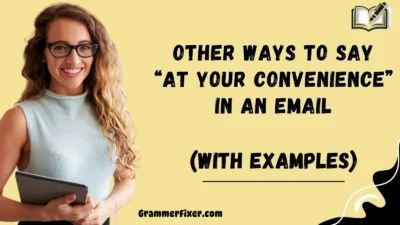Finding the right words to express gratitude can make all the difference in how your message is received. While the phrase “Thank you for your continued support” is a classic and professional expression, sometimes it may feel overused or generic.
This article offers 30 thoughtful alternatives that add warmth, sincerity, and personalization to your communication, whether in business settings, emails, letters, or casual conversations. By diversifying your expressions, you can ensure your gratitude feels genuine and heartfelt every time.
What Does “Thank You for Your Continued Support” Mean?
The phrase simply means expressing gratitude for someone’s ongoing assistance, loyalty, or encouragement over time. It acknowledges the steady presence and reliability of the person or group you’re addressing.
When to Use “Thank You for Your Continued Support”?
This phrase is best used when you want to recognize someone’s long-term commitment, such as clients, colleagues, partners, mentors, or team members. It works well in formal, professional, and semi-formal communications, especially when highlighting partnership, progress, or loyalty.
Is It Professional/Polite to Say “Thank You for Your Continued Support”?
Yes, it is highly professional and polite. However, because it is so commonly used, adding variety can make your message feel fresh, more personal, and memorable.
Pros or Cons of Using “Thank You for Your Continued Support”
Pros:
- Professional, polite, and respectful
- Universally understood
- Works in any business or formal setting
Cons:
- Can feel generic or overused
- May lack personal warmth or creativity
- Doesn’t always capture unique contexts
1. I Truly Appreciate Your Steadfast Support
Meaning: Deep gratitude for someone’s unwavering and loyal help.
Explanation: This emphasizes steadfastness and reliability, perfect for long-term collaborators.
Scenario Example: “I truly appreciate your steadfast support during this challenging project.”
Best Use: Professional emails, client acknowledgments, team updates.
Worst Use: In very casual chats or texts where formal wording feels out of place.
Tone: Formal yet heartfelt.
2. Your Loyalty Means the World to Me
Meaning: A warm acknowledgment of personal loyalty and commitment.
Explanation: Adds an emotional layer, making it more personal and sincere.
Scenario Example: “Your loyalty means the world to me, and I deeply value our partnership.”
Best Use: Semi-formal communications, colleagues, mentors.
Worst Use: In strictly corporate investor reports, where it might feel overly sentimental.
Tone: Warm and caring.
3. I’m Deeply Grateful for Your Ongoing Support
Meaning: Strong gratitude for continuous help and encouragement.
Explanation: Stresses depth of gratitude and ongoing nature of the relationship.
Scenario Example: “I’m deeply grateful for your ongoing support throughout this venture.”
Best Use: Clients, investors, sponsors.
Worst Use: In light-hearted or informal settings, where the depth might seem exaggerated.
Tone: Professional and sincere.
4. Thank You for Always Being There
Meaning: Appreciation for consistent presence and reliability.
Explanation: Simple, heartfelt, and less formal, but powerful in impact.
Scenario Example: “Thank you for always being there through the ups and downs.”
Best Use: Colleagues, close collaborators, mentors.
Worst Use: In formal legal or business contracts, where it can sound too casual.
Tone: Semi-formal, warm.
5. Your Unwavering Support Is Invaluable
Meaning: Highlights that the person’s support is irreplaceable.
Explanation: Conveys high regard and emphasizes significance.
Scenario Example: “Your unwavering support is invaluable to our mission.”
Best Use: Stakeholders, sponsors, senior management.
Worst Use: In everyday workplace banter — too formal for quick exchanges.
Tone: Formal, respectful.
6. I’m Thankful for Your Enduring Commitment
Meaning: Gratitude for long-lasting dedication and loyalty.
Explanation: Highlights time-tested support and enduring partnership.
Scenario Example: “I’m thankful for your enduring commitment to our shared goals.”
Best Use: Formal speeches, company reports, investor updates.
Worst Use: In casual group chats or informal notes, where it may feel stiff.
Tone: Professional, dignified.
7. I Sincerely Value Your Consistent Support
Meaning: Acknowledges someone’s reliable and steady presence.
Explanation: Great for situations where consistency has been a cornerstone of progress.
Scenario Example: “I sincerely value your consistent support throughout this quarter’s challenges.”
Best Use: Professional reports, client communications, project updates.
Worst Use: In personal friendships or casual settings, where “consistent support” sounds too corporate.
Tone: Formal, appreciative.
8. Your Continued Encouragement Keeps Us Moving Forward
Meaning: Thanks someone for being a motivating force.
Explanation: Adds recognition of emotional or morale-based support, not just tangible help.
Scenario Example: “Your continued encouragement keeps us moving forward, especially in tough times.”
Best Use: Team meetings, staff acknowledgments, morale-boosting notes.
Worst Use: In financial or transactional contexts with sponsors/investors — can feel too emotional.
Tone: Warm, uplifting.
9. I Cherish Your Long-Standing Support
Meaning: A deeply personal way to highlight time-tested loyalty.
Explanation: Emphasizes a long history of commitment and genuine care.
Scenario Example: “I cherish your long-standing support in helping us reach these milestones.”
Best Use: Long-term colleagues, mentors, or clients.
Worst Use: In short-term, new relationships — may feel insincere or exaggerated.
Tone: Warm, personal, heartfelt.
10. Thank You for Standing by Me
Meaning: Expresses gratitude for someone’s personal backing and presence.
Explanation: Conveys solidarity and emotional closeness, less formal than standard phrasing.
Scenario Example: “Thank you for standing by me during this transition period.”
Best Use: Colleagues, teammates, personal mentors.
Worst Use: In strictly corporate communications — may come across as overly personal.
Tone: Semi-formal, empathetic.
11. Your Constant Support Has Been a Great Asset
Meaning: Acknowledges support as an invaluable resource.
Explanation: Frames the recipient’s role as a key factor in success.
Scenario Example: “Your constant support has been a great asset to the team’s progress.”
Best Use: Business reports, client communications, formal presentations.
Worst Use: In casual thank-you notes — may sound too technical or impersonal.
Tone: Professional, respectful.
12. I’m Truly Thankful for Your Reliability
Meaning: Shows gratitude for someone’s dependable nature.
Explanation: Highlights trustworthiness and consistency as crucial traits.
Scenario Example: “I’m truly thankful for your reliability throughout this entire project.”
Best Use: Professional correspondence, addressing colleagues or service providers.
Worst Use: In emotional or highly personal messages, where “reliability” may feel cold.
Tone: Formal, straightforward.
13. I Appreciate Your Continuous Dedication
Meaning: Thanks someone for ongoing hard work and loyalty.
Explanation: Focuses on efforts and commitment rather than just presence.
Scenario Example: “I appreciate your continuous dedication to our mission.”
Best Use: Corporate addresses, team recognition, performance reviews.
Worst Use: In quick, casual exchanges — sounds overly formal.
Tone: Professional, dignified.
14. Your Steady Backing Has Made a Significant Impact
Meaning: Gratitude for consistent support that produces tangible results.
Explanation: Links the recipient’s backing directly to achievements or outcomes.
Scenario Example: “Your steady backing has made a significant impact on our progress this year.”
Best Use: Investor communications, donor acknowledgments, official statements.
Worst Use: In casual day-to-day chats, where it feels overly grand.
Tone: Formal, polished.
15. I’m Grateful for Your Unfailing Support
Meaning: Recognition of uninterrupted, dependable help.
Explanation: Puts emphasis on never letting down or withdrawing support.
Scenario Example: “I’m grateful for your unfailing support during this challenging transition.”
Best Use: High-stakes communications, formal appreciation speeches.
Worst Use: In informal or playful contexts, where “unfailing” feels too heavy.
Tone: Strong, respectful, sincere.
16. Your Lasting Support Has Been Truly Instrumental
Meaning: Highlights that the recipient’s support has played a pivotal role in success.
Explanation: Strongly conveys that without their help, progress would not have been possible.
Scenario Example: “Your lasting support has been truly instrumental in achieving our shared goals.”
Best Use: Donor acknowledgments, formal letters, stakeholder updates.
Worst Use: In short, informal thank-you texts, where “instrumental” may feel overly serious.
Tone: Formal, appreciative.
17. I’m Sincerely Thankful for Your Steady Encouragement
Meaning: Expresses gratitude for consistent motivation and belief.
Explanation: Focuses not just on actions, but on emotional encouragement that sustains morale.
Scenario Example: “I’m sincerely thankful for your steady encouragement throughout the project.”
Best Use: Team recognition, leadership messages, supportive workplace culture.
Worst Use: In strict financial reports, where encouragement is less relevant.
Tone: Warm, motivational.
18. Your Continued Dedication Is Truly Appreciated
Meaning: Acknowledges someone’s persistent hard work and loyalty.
Explanation: Centers on the effort and determination someone brings over time.
Scenario Example: “Your continued dedication is truly appreciated by the whole team.”
Best Use: Emails to staff, performance reviews, project wrap-ups.
Worst Use: In informal thank-you notes to friends or peers — sounds too corporate.
Tone: Professional, respectful.
19. I Value Your Persistent Support Immensely
Meaning: Thanks someone for their consistent backing despite challenges.
Explanation: “Persistent” adds nuance — support that remains even through obstacles.
Scenario Example: “I value your persistent support immensely as we navigate this change.”
Best Use: Business partners, colleagues during transitions, long-term clients.
Worst Use: In light, casual exchanges, where “immensely” feels dramatic.
Tone: Formal, serious.
20. Thank You for Your Enduring Faith in Our Work
Meaning: Gratitude for trust and confidence placed over time.
Explanation: A strong way to acknowledge belief in a team, mission, or project.
Scenario Example: “Thank you for your enduring faith in our work and vision.”
Best Use: Investor or sponsor communications, leadership speeches.
Worst Use: In simple workplace notes, where “faith” may feel too weighty.
Tone: Respectful, visionary.
21. I’m Humbled by Your Ongoing Commitment
Meaning: Expresses both gratitude and humility for long-term support.
Explanation: Ideal when you want to show respect and modesty alongside thanks.
Scenario Example: “I’m humbled by your ongoing commitment to our mission.”
Best Use: Formal correspondence with mentors, leaders, or benefactors.
Worst Use: In everyday peer-to-peer chats, where humility might feel misplaced.
Tone: Formal, reverent.
22. Your Steadfast Support Has Been a Guiding Light
Meaning: Frames support as a source of direction and inspiration.
Explanation: Adds a poetic, heartfelt quality, highlighting emotional impact.
Scenario Example: “Your steadfast support has been a guiding light through uncertain times.”
Best Use: Personal acknowledgments, speeches, team morale messages.
Worst Use: In corporate investor reports, where metaphorical language feels out of place.
Tone: Warm, inspiring.
23. I Greatly Appreciate Your Continuous Encouragement
Meaning: Acknowledges repeated reassurance and motivation.
Explanation: Perfect for moments where morale has been sustained by someone’s words and actions.
Scenario Example: “I greatly appreciate your continuous encouragement during this project.”
Best Use: Team updates, manager-to-staff appreciation.
Worst Use: In formal sponsorship letters, where encouragement may not be the key message.
Tone: Professional, supportive.
24. Thank You for Remaining a Strong Source of Support
Meaning: Recognizes the person as a reliable foundation of help.
Explanation: Highlights stability and constancy, emphasizing dependability.
Scenario Example: “Thank you for remaining a strong source of support for our team.”
Best Use: Long-term colleagues, partners, organizational stakeholders.
Worst Use: In informal or family contexts, where “source of support” sounds overly formal.
Tone: Professional, dignified.
25. Your Unbroken Support Has Made All the Difference
Meaning: Shows appreciation for support that never falters.
Explanation: The word “unbroken” emphasizes continuity without interruption.
Scenario Example: “Your unbroken support has made all the difference in our success.”
Best Use: Speeches, formal acknowledgments, milestone celebrations.
Worst Use: In short casual thank-yous, where “unbroken” feels too heavy.
Tone: Strong, formal, appreciative.
26. I’m Grateful for Your Sustained Support
Meaning: Expresses thanks for support that has been consistently maintained over time.
Explanation: “Sustained” highlights longevity and reliability, ideal for long-term relationships.
Scenario Example: “I’m grateful for your sustained support as we continue to grow and innovate.”
Best Use: Business partnerships, investor updates, sponsor acknowledgments.
Worst Use: In casual conversations with peers or friends, where it may sound too stiff.
Tone: Formal, professional.
27. Your Continued Backing Has Been Crucial
Meaning: Acknowledges that someone’s support has been essential to success.
Explanation: “Crucial” underscores significance and impact, perfect when the support has made a measurable difference.
Scenario Example: “Your continued backing has been crucial in completing this quarter successfully.”
Best Use: Stakeholders, project partners, company announcements.
Worst Use: In everyday thank-you notes, where it might sound overly heavy.
Tone: Professional, strong.
28. Thank You for Always Believing in Us
Meaning: Gratitude for trust and confidence, not just tangible help.
Explanation: Focuses on the emotional support of belief and trust, which can be just as valuable as actions.
Scenario Example: “Thank you for always believing in us, even when challenges seemed overwhelming.”
Best Use: Donor speeches, client relations, morale-boosting messages.
Worst Use: In dry business reports, where “believing” doesn’t align with tone.
Tone: Warm, inspiring.
29. I Deeply Appreciate Your Constant Encouragement
Meaning: Thanks someone for encouragement that never wavers.
Explanation: “Constant encouragement” reflects ongoing morale support, highlighting both emotional and practical contributions.
Scenario Example: “I deeply appreciate your constant encouragement throughout our journey.”
Best Use: Emails to team members, mentors, or close colleagues.
Worst Use: In formal sponsor or investor notes, where it could sound too emotional.
Tone: Semi-formal, heartfelt.
30. Your Support Has Been the Cornerstone of Our Success
Meaning: Frames support as the foundation of achievements.
Explanation: A powerful, formal way to highlight how someone’s contribution is at the heart of success.
Scenario Example: “Your support has been the cornerstone of our success, and we look forward to building the future together.”
Best Use: Annual reports, keynote speeches, investor recognition, donor acknowledgments.
Worst Use: In everyday or casual thank-yous, where it may feel too grandiose.
Tone: Formal, respectful, impactful.
Conclusion
Expressing gratitude with warmth, sincerity, and variety ensures your message never feels repetitive or generic. While “Thank you for your continued support” is a safe and professional phrase, these 30 alternatives allow you to:
- Highlight the recipient’s unique role (e.g., cornerstone, instrumental, guiding light)
- Adapt to tone and setting (formal, semi-formal, casual, warm)
- Avoid sounding overused by introducing fresh expressions
- Tailor your message to colleagues, clients, mentors, or stakeholders



